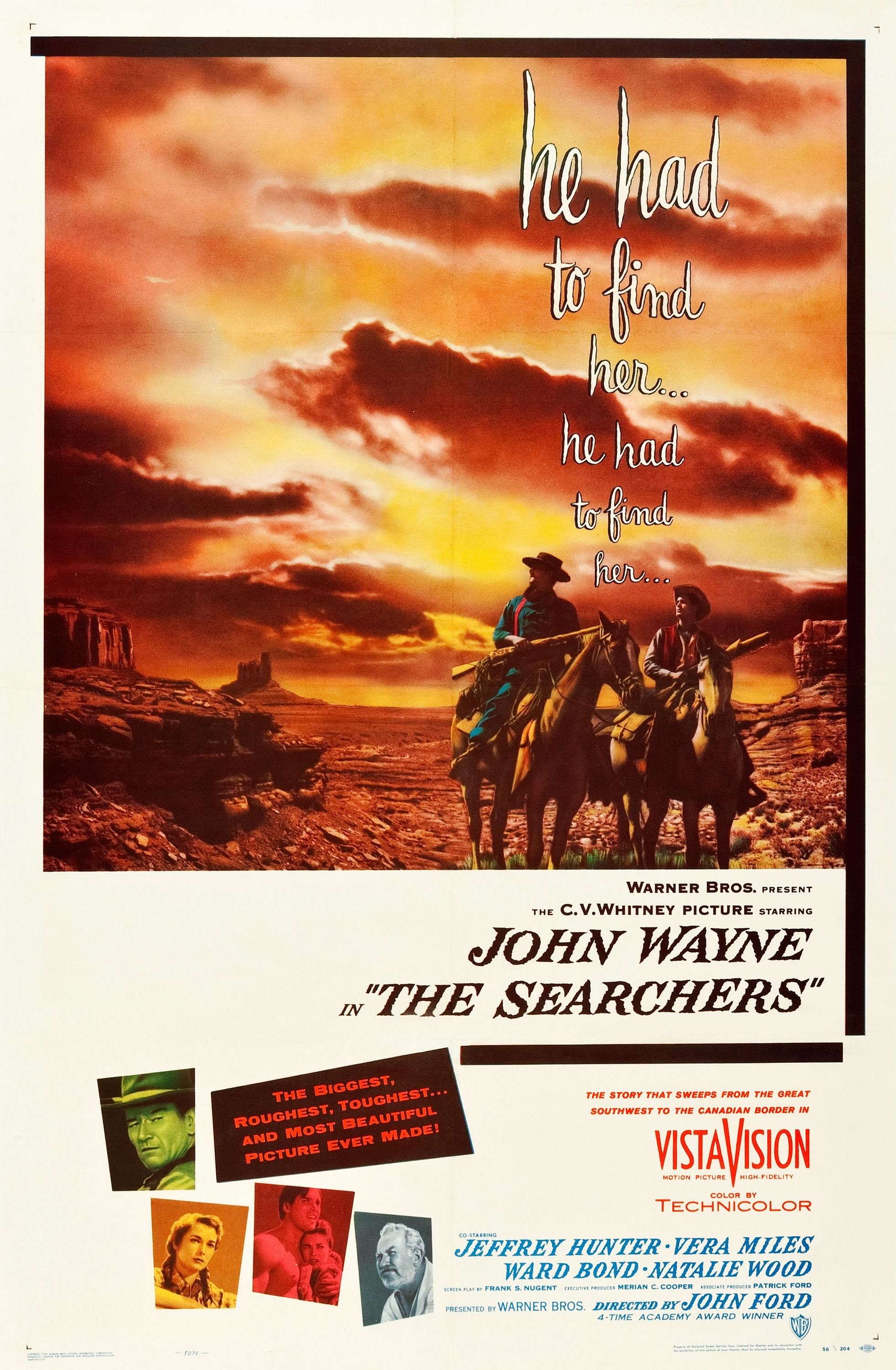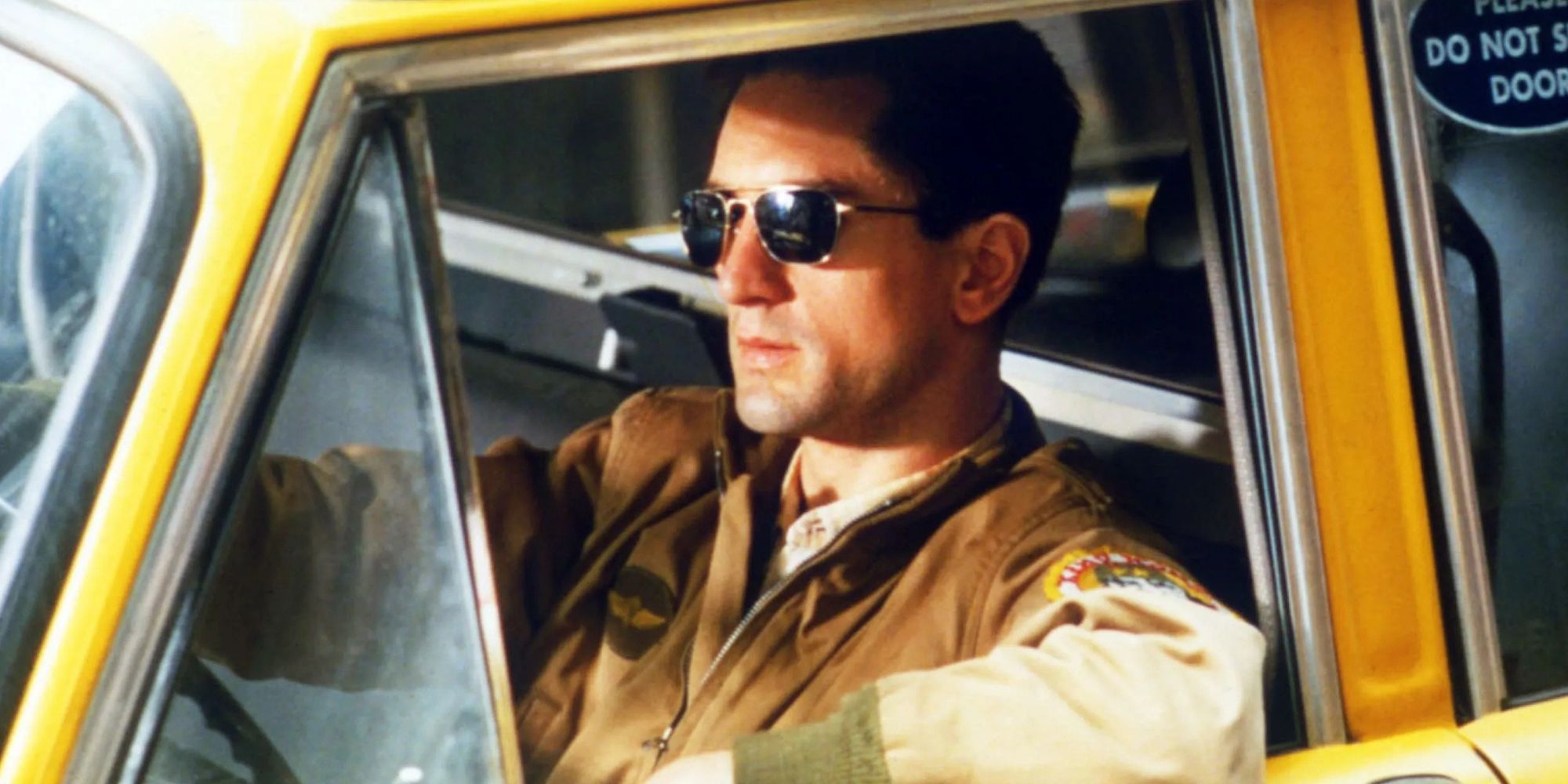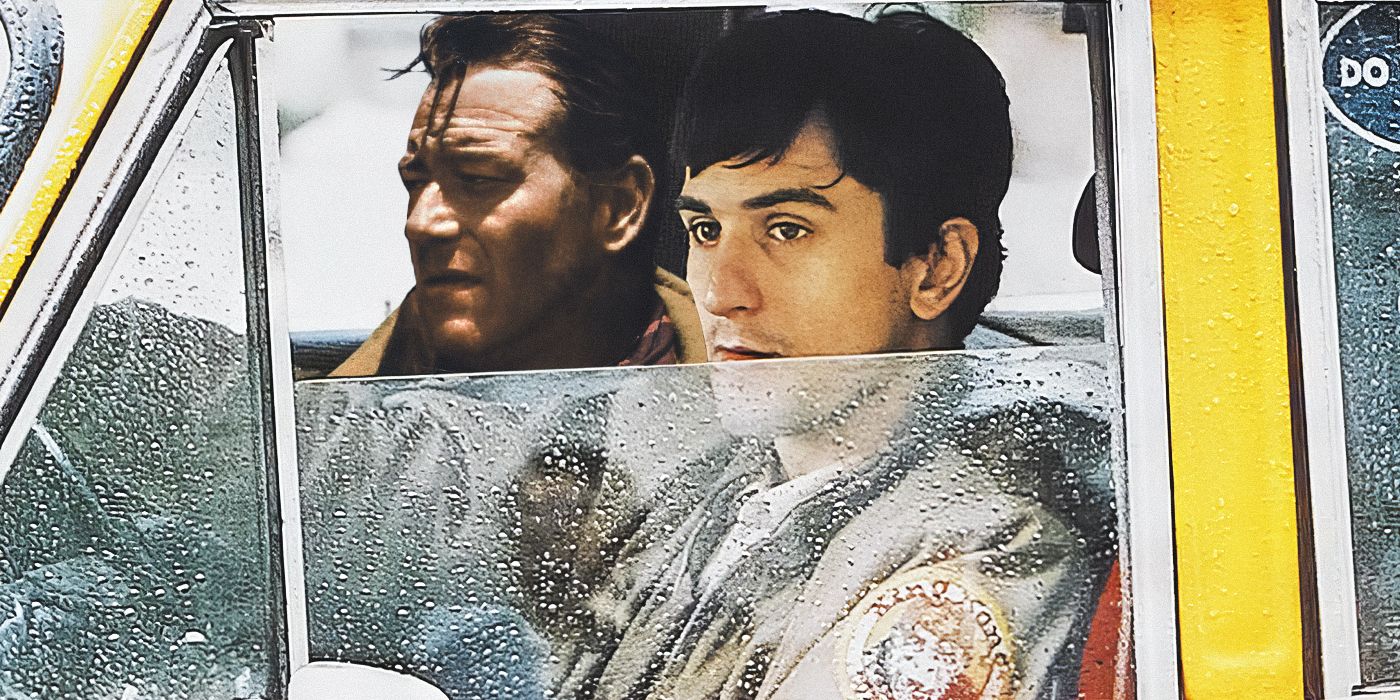The Big Picture
- The Searchers and Taxi Driver share a focus on the rescue of young women from toxic relationships, exploring themes of racism and toxic masculinity.
- Both films highlight the ambiguous motives of their protagonists, with their actions not necessarily absolving them of their immoral beliefs.
- The influence of The Searchers on Taxi Driver is evident in the loneliness of the main characters and their struggles to connect with others, as well as in their examination of racial hatred and fascination.
John Ford’s The Searchers is one of the most divisive films in history. The 1956 Western has been thoroughly criticized by many, both at the time of its release and in the decades since, for its depiction of racist characters and themes. But it is also considered by many filmmakers and cinephiles to be one of the greatest technical achievements in the history of film and one of the best works in Ford’s storied career. It has been regularly cited by many of the most prominent filmmakers of later years as a favorite film of theirs and a significant source of inspiration for their own work. One filmmaker on whom the film’s influence is especially pronounced is Martin Scorsese.
The celebrated director behind such classic films as Raging Bull and Goodfellas has spoken publicly about his views on The Searchers, citing both his intense admiration for its craft and his more complicated feelings about its controversial content. Although last year saw the release of Scorsese’s first Western, the critically acclaimed Killers of the Flower Moon, the influence of The Searchers is actually more apparent in one of his famed urban crime films. Taxi Driver may be set in a version of New York City accurate to its 1976 release date, but its lead character, themes, and plot bear overt similarities to those of The Searchers. Consequently, studying the two films in relation to one another reveals and emphasizes many of the complicated nuances that make them both so fascinating.

The Searchers
An American Civil War veteran embarks on a years-long journey to rescue his niece from the Comanches after the rest of his brother's family is massacred in a raid on their Texas farm.
- Release Date
- May 26, 1956
- Director
- John Ford
- Cast
- John Wayne , Jeffrey Hunter , Vera Miles , Ward Bond , Natalie Wood
- Runtime
- 119 minutes
- Main Genre
- Western
- Writers
- Frank S. Nugent , Alan Le May
'The Searchers' and 'Taxi Driver' Tell Similar Stories in Different Settings
Beginning in 1868, The Searchers follows Confederate soldier Ethan Edwards (John Wayne) who returns to his brother Aaron’s (Walter Coy) hometown in West Texas after a mysterious three-year period in which he was missing after the end of the Civil War. After a local Comanche tribe attacks the Edwards’ home, killing Aaron, his wife Martha (Dorothy Johnson), and their son and abducting their daughters Lucy (Pippa Scott) and Debbie (Lana Wood), Ethan and many of the local men, including several Texas Rangers set out to rescue his nieces. But after several Rangers are killed in a Comanche ambush and Ethan finds Lucy dead, and possibly raped, most assume that Debbie will have been killed too. Only Ethan and Debbie’s adopted brother, Martin Pawley (Jeffrey Hunter) continue to look for her, which they do for several years. Martin fears that Ethan’s hatred of Native Americans will lead him to kill Debbie if they find her, given that he has said it would be better to be dead than to live as a Comanche, but when they do free her from captivity at the hands of Comanche leader Scar (Henry Brandon), Ethan surprisingly shows mercy and carries Debbie back to her hometown.
The titular character of Taxi Driver is Travis Bickle (Robert De Niro), a Vietnam War veteran struggling with insomnia and loneliness who takes a job driving a cab at night. Travis’ difficulties socializing and frustration with the state of 1970s New York led him to become a vigilante, with him ultimately freeing child sex worker Iris (Jodie Foster) from her pimps, led by Matthew “Sport” Higgins (Harvey Keitel), who Travis kills in a brutal gun fight. The film’s final scenes show newspaper clippings praising Travis as a hero and a short reunion between him and Betsy (Cybil Shepherd), a woman he briefly dated before he makes a nervous glance in his rearview mirror that suggests that his violent urges are still part of him.
What Was 'The Searchers' Influence on 'Taxi Driver'?
The most obvious similarity between the two films, of course, is their shared focus on the rescue of young women from captors with whom they are in toxic romantic relationships (the adult Debbie, played by Natalie Wood, is one of Scar’s wives). But they are also linked by their explorations of themes of racial hatred and violence, and how racism is connected to toxic masculinity. Although his rescue of Iris may make Travis seem heroic, the rest of Taxi Driver makes it clear that few of his motives are truly altruistic and that he is almost equally disturbed and prejudiced as Ethan is. Early in the film, Travis asks out a Black woman who works at the concession stand of the porn theater he frequents, oblivious as to why this is potentially off-putting. She refuses and threatens to call her manager when Travis persists and, from that point on, he is shown being visibly uncomfortable in the presence of Black people.
One of several scenes narrated by an entry from Travis’ journal rants about what he sees as the lawless, corrupt nature of the city. His internal monologue states “All the animals come out at night,” as he drives past a sidewalk on which the crowd is predominantly Black. He also emulates a racist passenger, played by Scorsese, who tells him of his plan to kill his wife and the Black man she is having an affair with, by buying the same caliber gun as the one the passenger had. The connection between Ethan’s prejudice and Travis’ would have been even more pronounced if the pimps in Taxi Driver were Black, as they were in the original script. In an interview with The Guardian, screenwriter Paul Schrader praised the film’s producers for changing the pimps’ races to white, stating that, “In the original script, it was just a racist slaughter.”
Furthermore, although he previously tried to persuade her to leave them, and offered to help her do so, Travis doesn’t commit to attacking the pimps and freeing Iris until after his attempt to assassinate Charles Palantine (Leonard Harris), the presidential candidate Betsy works for, fails. This suggests that his vigilante mission may have been motivated just as much by his need to act on his violent impulses as it was by an altruistic desire to help Iris. Scorsese and Schrader highlight why this ambiguity in his motives should give viewers pause over praising Travis’ actions, despite their one undeniably positive outcome of freeing Iris. This point can be applied to Ethan as well. It’s entirely possible that Ethan only devoted himself to looking for Debbie for so long because of his racism, with him seeking to kill her due to his belief that her living with the Comanches contaminated her in some way. The fact that Martin has to shield Debbie from Ethan so he doesn’t shoot her when they first find her supports this interpretation. Ethan’s last-minute change of heart shouldn’t absolve him of judgment for this prejudice, just as Travis saving Betsy shouldn’t absolve him of his immoral actions or beliefs.

Martin Scorsese’s Scary ‘Taxi Driver' Cameo Was a Last Minute Recast
The director didn’t intend to play a vile man who reveals his creepy secrets to Travis Bickle.Schrader acknowledged The Searchers’ influence on Taxi Driver to Politico and Scorsese’s retrospective review of the earlier film for The Hollywood Reporter highlights qualities of it that are echoed in his own masterpiece. Scorsese describes Ethan’s loneliness as a quality that separates him from other famous characters played by John Wayne and the influence of this on his film is obvious. Loneliness is arguably the most prominent theme in Taxi Driver, with Travis referring to himself as “God’s lonely man,” in one of his journal entries. Ultimately, most of his decisions and actions can be traced back to his desire to connect with others and the difficulties he experiences doing so. He takes Betsy to a porn movie on a date, believing this is a normal choice of activity, and the resulting collapse of their relationship hastens Travis’ transformation into a vigilante and directly inspires his assassination attempt, the failure of which in turn leads him to take the decisive, violent action to save Iris. Scorsese also notes how elements of Ethan’s characterization, including his immense knowledge of Native American culture and customs, emphasize “the craziness of race hatred,” in which “murderous fixation and disgust are side by side with fascination and attraction.” Taxi Driver also represents this contradictory craziness through Travis’ unsuccessful flirting with the Black woman.
The Relationship Between 'The Searchers' and 'Taxi Driver' Makes Them More Interesting
There are more than enough differences between the two films to keep them distinct, of course, in addition to their different settings. Taxi Driver doesn’t feature any character with a role remotely similar to that of Martin Pawley, for example, and many of The Searchers’ supporting characters provide kinds of slapstick comedy that are absent in Scorsese’s film. The Betsy and Palantine storylines are also fairly unique to Taxi Driver. Although Ethan’s rapport with Martha has been interpreted by many viewers as suggestive of a shared romantic attraction, her early death prevents this dynamic from being explored significantly. The other major romance in The Searchers, that being the one between Martin and his neighbor Laurie Jorgensen (Vera Miles) is mostly a source of fun and even comes to an optimistic conclusion, making it entirely different from the doomed affair between Travis and Betsy. Regardless, the stories of Debbie and Iris and the shared focus on themes of racism and masculinity make the connection between the films plain, and having the other in mind while watching either film makes them both more rewarding experiences.
Taxi Driver is available to rent on Apple TV+ in the U.S.

